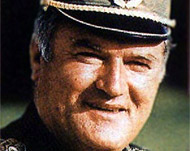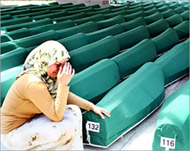Bosnian war criminals still on the run
Ten years after a UN tribunal indicted Radovan Karadzic and Ratko Mladic for the worst bloodshed in Europe since the second world war, the world’s two most wanted war crimes fugitives remain free.

So, where are they hiding?
The two indicted masterminds of the brutal Bosnian Serb offensives against rival Bosnian Muslims remain at large despite an international outcry for their capture, and a $5 million per head promised by the United States for information leading to their extradition to the UN tribunal.
Karadzic, the Bosnian Serb wartime leader, and General Mladic, the military commander, have been evading justice since they were jointly indicted by the Netherlands-based tribunal on 25 July 1995 – frustrating international officials and UN war crimes prosecutors who want them captured and tried.
The two, who top the UN tribunal’s wanted list, stand accused of numerous war crimes, including genocide in the July 1995 slaughter of up to 8000 Bosnian Muslim men and boys in the UN-protected Bosnian enclave of Srebrenica, Europe’s worst massacre since the second world war.
Top Serbian and Bosnian officials and Western diplomats say Karadzic and Mladic are relying on disguises, multiple hiding places and a shadowy network of supporters to remain free.
Disguises
UN war crimes prosecutors believe Karadzic is hiding in the Serb-controlled half of Bosnia, while Mladic was last seen in neighbouring Serbia.
 |
|
Ratko Mladic is said to have led |
Both often cross from one Balkan state to another, frequently using the mountainous border area – and the popularity they still enjoy among Serb nationalists – to evade capture, the prosecutors say.
Those who have seen Karadzic say he has shaved off his trademark bushy hair, has grown a large beard and dresses in black robes to look like a Serbian Orthodox priest. He often changes his hideouts, including monasteries and refurbished mountain caves, Western officials say.
The commander of the European Union’s peacekeepers in Bosnia, British Major-General David Leakey, said earlier this month that “the net is closing in” on the two suspected masterminds of the Srebrenica slaughter.
But former US envoy Richard Holbrooke, the architect of the 1995 Bosnian peace agreement, dismissed this claim.
“Nets are for fishing expeditions. You don’t capture war criminals whether it is Osama bin Laden, Radovan Karadzic or Saddam Hussein by going fishing,” Holbrooke recently said.
For Karadzic “there is a $5-million reward out and it’s going to be either patriotism or financial interest”, that will prompt some Bosnian Serb to turn him in, he said.
Secret meetings
In the past, Karadzic travelled in ambulances with flashing lights to zip through Nato checkpoints undetected. Now, he travels only at night and avoids main roads, using forest paths through rugged Bosnian mountains, Western diplomats said.
 |
|
Up to 8000 Muslim men and boys |
His associates say Karadzic has often slipped into Pale, the Bosnian Serb wartime capital, for night time visits to his wife Ljiljana, daughter Sonja and son Sasa.
Ljiljana said last week that Sasa and Sonja had not seen the wartime Bosnian Serb leader since 1998 when he went into hiding. She added that she met him once briefly in 2001 in a visit apparently organised at a secret location by his security forces.
“I received a message, I saw him for an hour and left,” she said, adding that she did not know the location of their meeting.
“It’s better that we don’t know because we would be the weakest link. They [Nato, EU troops] know that we don’t know because they follow us all the time. We have also found various listening and tracking devices on our cars.”
Srebrenica
Mladic, who is accused of leading the Srebrenica slaughter, lived freely in Serbia’s capital, Belgrade, until 2002, showing up openly at soccer stadiums, dining in plush restaurants, attending his son’s wedding, and visiting his daughter’s grave at Bezanijska Kosa graveyard.
When, under Western pressure, Serbia’s new pro-democracy authorities signalled that they might have to hand Mladic over to the tribunal, he disappeared from public view.
The UN war crimes prosecutors have accused the Serbian military of sheltering Mladic.
 |
|
Top UN prosecutor Carla Del Ponte |
Serbia is under relentless Western pressure to arrest Mladic. But its conservative leadership has been reluctant to act, fearing a backlash from an electorate which considers the tribunal anti-Serb, and still rates Mladic and Karadzic as national heroes.
“Negotiations on Mladic’s surrender are ongoing since December,” said Matasa Kandic, Serbia’s leading human rights activist who is investigating war crimes during the Balkan wars in the 1990s.
“At this moment, it is being decided whether he’ll disappear for good by hiding somewhere in Russia, or surrender under his terms,” Kandic said, contradicting official government claims that his whereabouts were unknown.
UN war crimes prosecutors are furious.
“We are not interested in any negotiations” with Mladic or Karadzic, said Florence Hartmann, the spokeswoman for chief UN prosecutor Carla Del Ponte.
“There should be no compromise over their capture and extradition.
“What we have here are indictments for the slaughter of thousands.”